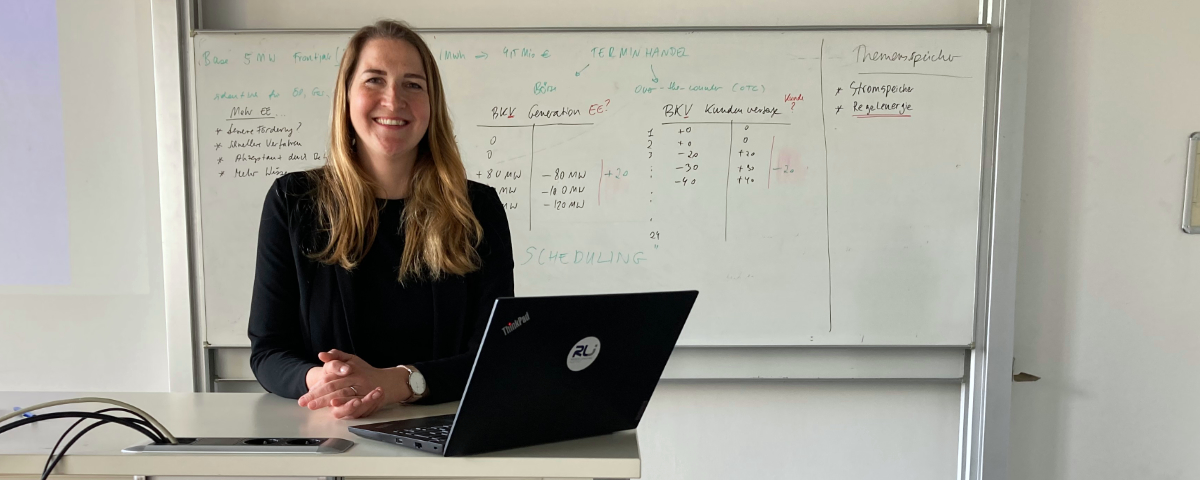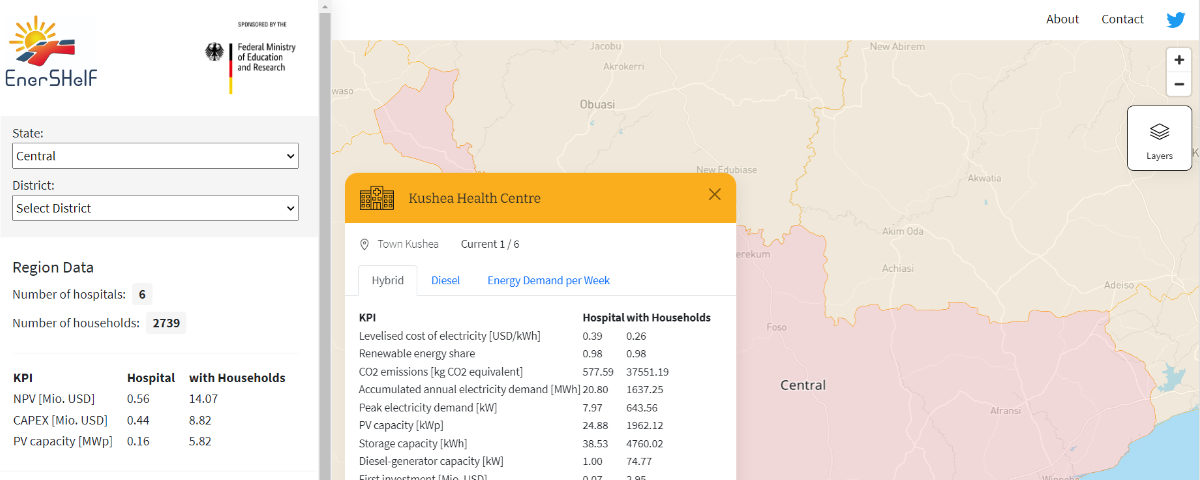
Kathrin Goldammer takes on lectureship at HTW Berlin
27. April 2023
03. – 04.05 | 3rd CHARGETEC: Charging Technology & Charging Infrastructure for Electric Vehicles
3. May 2023Power supply to health facilities in Ghana: RLI releases data and digital map

May 2, 2023 | The Reiner Lemoine Institute (RLI) has released several data packages with information on health facilities, households, and electricity demand and supply in Ghana under an open-data license and illustrated them in an interactive digital map (webmap). It helps users to visualize and plan electrification strategies for health facilities and their surrounding communities. Photovoltaic-based, small-scale power grids (mini-grids) can help overcome energy shortages and reduce frequent power outages. The data packages were compiled as part of EnerSHelF – a German-Ghanaian research project to improve energy supply for healthcare facilities in Ghana. They are available for public use.
The power grid in Ghana is unstable and power outages – known locally as ‘dumsor’ – occur regularly. Both can cause significant damage to healthcare services and put lives at risk if, for example, operating room lights or life-saving medical equipment simply fail.
Feasibility study on electrification with PV systems
RLI scientist’s task was to model energy systems as part of a feasibility study that would help with a nationwide strategy for electrification and market introduction of PV hybrid systems. To do so, they simulated load profiles for different types of healthcare facilities as well as for surrounding households with region-specific wealth distribution and optimized energy systems based on these profiles. The data and results have been published on the Harvard Dataverse platform. For easy use and visualization of the information, the project team developed a new interactive web map and made it publicly available.
“A key finding of the feasibility study is that the cost of electricity with a diesel-only system is about four times higher than with a hybrid PV-battery-diesel system. Furthermore, it became clear that including the surrounding households in the energy system planning proved promising for balancing the short but high peak loads of the healthcare facilities,” explains Katrin Lammers, researcher in the Off-Grid Systems research unit.
Webmap makes data on energy supply visible
The data packages contain geo-referenced information on the locations of hospitals in Ghana, the power network infrastructure and the population density of the settlements around the healthcare facilities considered for the study. In addition, there are techno-economic input data for energy system modeling, such as the local purchasing cost of system components or the local price of diesel. The data show which energy needs and system capacities of different system components exist and which electricity requirements are typical for the individual regions.
A web map makes this data visible: with just a few clicks, users can see, for example, how high electricity consumption is in a particular region, at what times it is particularly high, where the electricity comes from, whether the electricity is generated from renewable sources, and how high the costs are to be able to operate the systems sustainably. This is a prerequisite for determining the prices that ultimately have to be paid by households and hospitals, or through appropriate subsidies.
This information helps researchers and project planners, for example, to optimize the power supply according to various requirements. Hospital operators, entrepreneurs and even political stakeholders can use it to expand renewable energies, especially solar energy, in Ghana in order to improve the power supply.
“Healthcare facilities have very specific energy needs. They do not have a standard load profile like households, but are characterized by short high load peaks – for example, when an X-ray machine is used. We took this into account for our modeling of the energy systems. These assumptions were also confirmed by on-site load measurements,” explains Avia Linke, researcher in the Off-Grid Systems research unit.
About the project EnerShelF
In the German-Ghanaian collaborative project EnerSHelF, partners from academia and practice have worked together on technical and political economy issues to improve and disseminate marketable PV-based energy solutions for healthcare facilities in Ghana. The project was funded in the period 1.6.2019 – 31.3.2023 in the measure CLIENT II by the German Federal Ministry of Education and Research and coordinated in a lead role by the Bonn-Rhein-Sieg University of Applied Sciences. Within the project, the consortium’s researchers have set up among others PV systems, devices for load measurement, weather stations or battery systems at three locations in Ghana – Akwatia, Kumasi and Kologo – and thus collected a large amount of relevant weather and load data of the health facilities. Other outputs of the EnerShelF project include two policy briefs on “Improving Energy Supply to Health Facilities – Ghana Facilities Require Interdisciplinary Perspectives” and “Exploring Conditions for Demand for Solar Systems in Ghanaian Health Facilities.” The briefings are aimed at policy makers in Ghana.
Further information:
Data packets: https://dataverse.harvard.edu/dataverse/enershelf
Webmap: https://enershelf.rl-institut.de/
More about the project: https://enershelf.de/
Policy Briefs: https://enershelf.de/?p=1269
Press contact RLI
Timo Beyer
Communication
Tel.: +49 30 12084 3415
E-Mail: presse@rl-institut.de
Project manager RLI
Catherina Cader
Head of Unit Off-Grid Systems
Tel.: +49 30 12084 3460
E-Mail: catherina.cader@rl-institut.de




